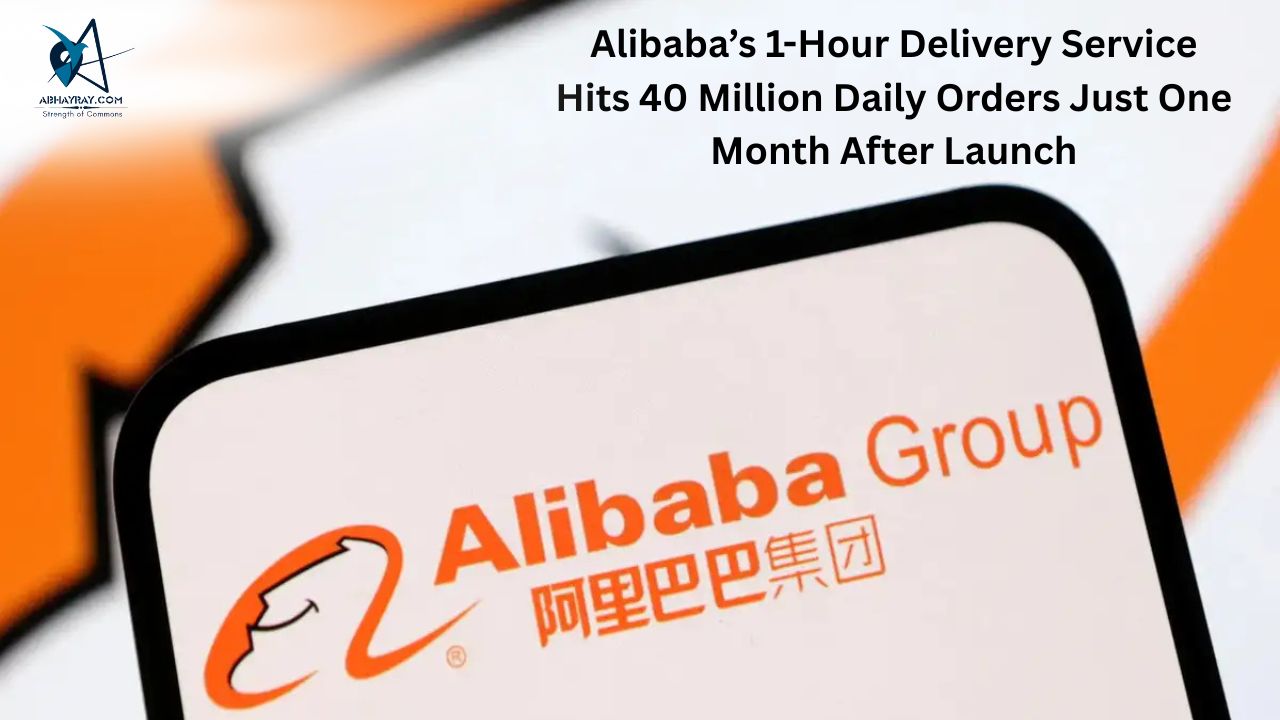Introduction
Chinese e-commerce giant Alibaba said its Taobao Instant Commerce platform, which launched less than a month ago with deliveries in less than an hour, has surpassed 40 million daily orders, in a fresh sign of the growth of the country’s “instant retail” trend. Alibaba launched the service late last month bringing together its Ele.me food-delivery offerings along with other items that it said could be time-sensitive for consumers, such as electronics, clothing and flowers. Ele.me is handling the orders for the new service, which launched initially in 50 Chinese cities and expanded to all users of the Taobao e-commerce platform in early May.
Alibaba Launches Fast Delivery with Ele.me
The new service, which has products delivered by Ele.me, aims to fulfil online orders of food and consumer items in less than an hour. It reached 10 million daily orders within its first week of launch on April 30, the company previously said. Before the recent surge in rivalry, China’s food delivery market was primarily dominated by Meituan and Ele.me, with Beijing-based Meituan holding a larger share. But after JD.com joined the fray earlier this year, the market consisting of about 553 million users had shifted into a “competition of ecosystems”, according to a recent report from Chinese research firm MCR. Alibaba is leveraging its extensive resources in online shopping, delivery and algorithms to maintain its dominant position in China’s e-commerce sector, as competition intensifies in the instant commerce segment.
Taobao Instant Commerce, accessible via Alibaba’s popular Taobao online shopping app, initially attracted users with subsidies on popular drinks, such as milk tea. However, sources familiar with the matter, who declined to be named, said drinks currently represented a small fraction of daily order volume, as demand was spread across a broader range of categories. JD.com, Alibaba’s long-standing e-commerce rival, entered the food delivery space in February. By mid-May, it said daily orders for its new service had reached 20 million, after surpassing 10 million in late April. In a bid to highlight the company’s resolve to challenge Meituan, JD.com founder Richard Liu Qiangdong donned a uniform to transport meals on an electric bike in Beijing in a publicity stunt last month.
Meituan, the largest player in China’s food delivery market, has not disclosed its daily order volume after officially launching its on-demand retail brand, Meituan Instashopping, in April. However, the company said on Monday that the service, operational since 2018, had “maintained a robust growth trajectory” in the first quarter, with categories such as drinks, snacks, digital products, home appliances and beauty “posting remarkable growth”. Total transacting users surpassed 500 million, with orders in the non-food category growing over 60 per cent during the period. Meituan said in April that non-food orders on its platform exceeded 18 million. Amid a costly battle, Hong Kong-listed shares of Meituan and JD.com have both lost more than 30 per cent since their peak in early October, while Alibaba has remained largely unchanged.
‘Instant’ Commerce
The move brought together Alibaba’s delivery network, which has been competing with local market leader Meituan in food delivery, with its established online marketplaces. E-commerce giant JD.com has also been augmenting its delivery capabilities to take on Meituan and boost sales. China’s e-commerce players have been constantly seeking to expand their appeal amidst tough competition, with one of the more recent trends being livestream e-commerce, which is a major revenue generator in Asia and recently began gaining popularity in the US and Europe.
Meituan, which leads China’s food-delivery market, on Monday reported a 46 percent increase in first-quarter profit over the same period last year, but cautioned that the second quarter would see a hit amidst rising competition in instant retail. Meituan had been expanding beyond food delivery into rapid delivery of other items, and JD.com responded in February by aggressively targeting Meituan’s core food-delivery business with JD Takeaway.
Stock Prices Drop Amid Fierce Competition
Chinese regulators have also expressed concerns over the heated competition. On May 13, the State Administration for Market Regulation summoned JD.com, Meituan and Ele.me for a meeting, urging them to “fulfil social responsibilities” and “compete fairly” – a sign of increased regulatory oversight in the sector. Still, the aggressive competition shows no sign of abating, as company executives pledged to raise subsidies in their respective programmes.
Wang Xing, founder and CEO of Meituan, said in a post-earnings call on Monday that the company planned to invest 100 billion yuan (US$13.9 billion) over the next three years to drive growth in the domestic food service industry.
“We are going to take whatever measure it takes to win the game,” Wang said. However, he warned that the company would see “volatility in short-term financial results” due to heightened competition.
Jiang Fan, CEO of Alibaba E-commerce Business Group, said earlier this month that the company would “invest aggressively” in on-demand delivery, with the aim to convert more Taobao users to its on-demand delivery service, which had “vastly exceeded original expectations”.
Conclusion
China’s instant commerce sector is undergoing rapid transformation as major players like Alibaba, JD.com, and Meituan intensify efforts to dominate the one-hour delivery market. Alibaba’s Taobao Instant Commerce has surged past 40 million daily orders within a month, highlighting consumer demand for ultra-fast fulfillment. JD.com’s aggressive expansion and Meituan’s pivot toward non-food retail deliveries further underscore the shift toward a broader instant delivery ecosystem. However, this fierce competition has triggered regulatory scrutiny and sharp stock declines for some players. With billions in investments pledged and consumer expectations rising, China’s e-commerce landscape is entering a new phase where speed, scale, and strategic integration will define market leadership.
GMICapitals.com RaysVeda.com GetMyStartup.com LawCanal.com GetMyIndia.com ZinCob.com Angeltors.com

